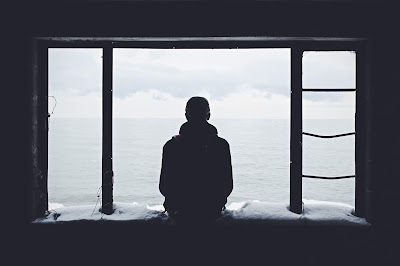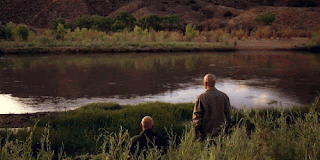"Death must be so beautiful. To lie in the soft brown earth, with the grasses waving above one's head, and listen to silence. To have no yesterday, and no tomorrow. To forget time, to forget life, to be at peace."- Oscar Wilde, The Canterville Ghost
It is another
insomniac night, and sleep has been a distant dream, the moment I try to
close my eyes, I have this sudden burst of anxiety (In whatever chemical form
it is found in our body) rush through my veins. The group of butterflies in my
stomach elevates my anxiety to its peak level. I feel like a student sitting in
an examination hall about to give the most vital exam of his career. I think
about random topics to ponder over in order to occupy my mind, because that is
the most appropriate pastime for an insomniac, TO THINK.
 |
| Photo by Noah Silliman on Unsplash |
I randomly browse
through various topics in my mind, that I wanted to think about, but I could
not stick to a particular one, like my insecurities, my anxiety, my fears, my
ambitions. I opened Twitter, just to divert my mind, I scroll through my
timeline, desperate in search of something that stays with me through this
silence, which have become my companion. A national award-winning lyricist and
writer, I follow had tweeted few hours back 'Dying in sleep would be such a
calm and hassle-free way to leave this world and end your journey', I
immediately knew, that this is the topic I am going to ponder over and put my
thinking neurons on work.
As Dr Sheldon Copper
suggest, that during such period of analysis, we must put on our thinking cap,
so I do the same, and ponder over DEATH.
Death is inevitable; we all are going to die;
the mediums might differ but result would be same. Heart will not pump the
blood; oxygen supply to the brain would stop. Whenever someone in a Punjabi
family die, people communicate the news to each other by saying “O Poora
Hogaye” literally meaning the person is complete. I recall an instance asking
my grandmother what this sentence means, she responded with an elaborate
explanation that how Sikh consider life as a cycle, starting point being their
birth, and ending point being their death. She further went to explain me how
death is an impartial phenomenon. It does not discriminate humans on their
religion, gender, age, social status.
I recalled another
memory, which made me a bit uncomfortable, I tried to re-frame the entire
scenario in my mind, my grandfather came to his room, sat on his moving chair,
asked a glass of water, closed his eyes and within moments he left us. In a
chaotic world, dying in silence and peace would be such a pertinent path to
complete our journey. Mike Ehrmantraut, one of the coolest characters in
Breaking Bad, ignores Walt’s apology and tells him and to shut the fuck up and
let him die in peace. It is one of the subtlest sequences of a person accepting
his death and trying to find solace in it.
 |
Mike Ehrmantraut finding
Peace in Death
|
 |
Mike Ehrmantraut finding
Peace in Death
|
I try to analyze death,
Is
it a sensation leading to permanent desensitization?
Is
it a form of sharp sound waves that arrives with a crescendo of music piercing
our eardrums?
Does
it seem as an angel calmly whispering in our ears that we are going to a better
place?
Or
does it appear as a devil disguised as an angle trying to con us in the lure of
a better place?
Is
it the transporter that takes our soul into the field, which is beyond the idea
of wrongdoing and rightdoing that Rumi, has talked about?
Death, on many instances does not
seem as easy and peaceful; it often is brutal, heartbreaking affecting not only
a single person for whom it is meant for at the first place, but also to
everyone related to that person. It build’s organically into your mind, taking
your body and mind through the path of loneliness, pain and slowly leaving your
body and mind to wonder around in an undefined space.
I try to create a fictionalized
scenario on death (if that’s an fitting way to present it), if a person is on
the verge of death through any means, be it a pathological condition, or a
psychiatric condition or simply through an aging cause, slowly their organs
would stop functioning properly leaving the subject under extreme physical
disturbance, and emotional distress for their loved ones, few lucky one’s would
be able to bid good-bye to their loved ones, other’s won’t be able to say a
proper goodbye to their loved ones. The moment body stops responding and
physiological function stops, the soul leaves the body taking along with itself
a jar consisting of thousands of emotions, be it guilt, heartbreak, happy
memories, rejections, moments of utter loneliness, moments of pleasure. The
soul enters the undefined space, wandering around and seeking another medium to
encompass all the emotions with it.
Does the undefined space act as the divider between Heaven
and Hell?
Does the undefined space form a minuscule portion of the
gigantic universe, where the soul rambles around?
Does the undefined space keep the soul, and later prepares
it to be transmitted into another body (acting as a medium), by loosely forming
the basis of consciousness through the jar of emotions the soul has kept?
Another thought hit my mind, what happens when a person
dies a premature death, does the scenario post death remains same? Does
their soul wonder around the undefined space seeking out an appropriate medium
to transfer the large chunk of emotions? Another scenario is that the
point of soul-searching for another medium might come from the fact that my
subconscious level makes me want to believe on the perspective of
reincarnation. May be the undefined space acts as cloud storage for the
emotions when a person dies leaving the soul wandering around the universe. It
is an indication that once our journey ends, there is no alternative route to
start the same journey, the road end there.
The advances made in the Quantum theory has led to
development of many novel theories that try to put different perspectives on
death, life after death with respect to consciousness, time, space and the universe.
I try not to go deeper into quantum aspects of death, instead I try to focus on
my fictionalized scenario and stick to it, and indirectly telling myself that I
had an eventful insomniac night analyzing death.
I try to rewind the entire self-mediated thoughts on death,
and get answer to several odd questions from myself, the nature of death (Not
suicidal, but in widespread reason), the self-created undefined space, which
even I am not sure how to characterize it, the soul containing a jar of emotions,
the basis of reformation of consciousness to lend the soul into another medium.
I go outside my small room, and walk into the verandah,
it’s about to dawn, and I am far away from understanding death,
Do I really need to? I ask myself, probably no, and that
reassured stimulated ‘NO’ comes
subconsciously from the fact that we have to accept it under any
circumstances.
Very thoughtfully written, and very thought provoking :)
ReplyDeleteHi. This was an interesting but lengthy article to read. You could have made it shorter or into two parts. Death is a very serious topic to write about or even think. Death is no easier to define; indeed, medical advances and technology have only made it tougher to determine when a person is, in fact, dead. Not that identifying death without medical technology was any picnic, either. Imagine for a moment that you lived several hundred years ago. You're at home with the matriarch of the family, who appears to have died. You don't call a doctor for help; rather, you would have called the local priest to make the determination of death. The family and the priest would only have outward signs that the person was dead -- they may have held a mirror to the woman's mouth or a feather above her nose to look for signs of breath. If the mirror didn't cloud or the feather didn't move, then that person was as good as gone. Our body is like a guesthouse and our mind like the guest; when we die our mind has to leave this body and enter the body of our next rebirth, like a guest leaving one guesthouse and travelling to another. The mind is neither physical, nor a by-product of purely physical processes, but is a formless continuum that is a separate entity from the body. When the body disintegrates at death the mind does not cease. Although our superficial conscious mind ceases, it does so by dissolving into a deeper level of consciousness, the very subtle mind; and the continuum of the very subtle mind has no beginning and no end.
ReplyDeleteA lot of good thought-provoking points in there. The writing is sublime. Thank you for sharing the link. Good luck.
ReplyDeleteI guess death is one of the most toughest topics to think about & discuss in this world. Different religions have come upon this world based on different concepts of what is death & what comes after. I found your thoughts interesting. I understand that your concept of death & what comes afterwards is influenced by your belief in reincarnation which I identify with. Particularly, the idea of "loosely forming the basis of consciousness through the jar of emotions" I've found very interesting. You really should consider your sleepless night well spent.
ReplyDeleteThank you for reading....:)
Delete